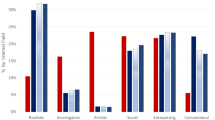Abstract
In a recent Psychological Research article, Moxley, Ericsson, and Tuffiash (2017) report two studies of SCRABBLE expertise. The results revealed that the average SCRABBLE rating was higher for males than for females. Moreover, correlational and structural equation analyses revealed that activities that the authors refer to as “purposeful practice” accounted for a substantial amount of the variance in SCRABBLE ratings. The authors generalize their findings concerning SCRABBLE to STEM careers. We believe this generalization is unjustified, as is their argument that SCRABBLE can be used to understand the gender gap in STEM fields. Moreover, the authors’ conclusions are undermined by inconsistencies and contradictions in their arguments. We discuss these problems with Moxley et al.’s article in terms of their impact on the cumulative science of expertise.

Similar content being viewed by others
References
Bauer, M. W., & Microsoft, Inc. (2017). Why Europe’s girls aren’t studying STEM. (White paper). Microsoft Philanthropies Europe.
Charness, N., Tuffiash, M., Krampe, R., Reingold, E., & Vasyukova, E. (2005). The role of deliberate practice in chess expertise. Applied Cognitive Psychology, 19, 151–165. https://doi.org/10.1002/acp.1106.
De Welde, K., & Laursen, S. (2011). The glass obstacle course: Informal and formal barriers for women Ph.D. students in STEM fields. International Journal of Gender, Science and Technology, 3, 571–595.
Duckworth, A. L., Kirby, T. A., Tsukayama, E., Berstein, H., & Ericsson, K. A. (2011). Deliberate practice spells success: Why grittier competitors triumph at the National Spelling Bee. Social Psychological and Personality Science, 2, 174–181. https://doi.org/10.1177/1948550610385872.
Ericsson, K. A. (1996). The acquisition of expert performance: An introduction to some of the issues. In K. A. Ericsson (Ed.), The road to excellence: The acquisition of expert performance in the arts and sciences, sports, and games (pp. 1–50). New York: Lawrence Erlbaum Associates.
Ericsson, K. A. (1998). The scientific study of expert levels of performance: General implications for optimal learning and creativity. High Ability Studies, 9, 75–100. https://doi.org/10.1080/1359813980090106.
Ericsson, K. A. (2000). How experts attain and maintain superior performance: Implications for the enhancement of skilled performance in older individuals. Journal of Aging and Physical Activity, 8, 366–372.
Ericsson, K. A. (2005). Recent advances in expertise research: A commentary on the contributions to the special issue. Applied Cognitive Psychology, 19, 233–241. https://doi.org/10.1002/acp.1111.
Ericsson, K. A. (2012). The danger of delegating education to journalists: Why the APS Observer needs peer review when summarizing new scientific developments. Unpublished manuscript. https://psy.fsu.edu/faculty/ericssonk/ericsson.hp.html. Accessed 5 Mar 2020.
Ericsson, K. A. (2015). Acquisition and maintenance of medical expertise: A perspective from the expert-performance approach with deliberate practice. Academic Medicine, 90, 1471–1486. https://doi.org/10.1097/ACM.0000000000000939.
Ericsson, K. A., Krampe, R. T., & Tesch-Römer, C. (1993). The role of deliberate practice in the acquisition of expert performance. Psychological Review, 100, 363–406. https://doi.org/10.1037/0033-295X.100.3.363.
Ericsson, K. A., & Moxley, J. A. (2012). A critique of Howard’s argument for innate limits in chess performance or why we need an account based on acquired skill and deliberate practice. Applied Cognitive Psychology, 26, 649–653. https://doi.org/10.1002/acp.2841.
Ericsson, K. A., Perez, R. S., Eccles, D. W., Lang, L., Baker, E. L., Bransford, J. D., et al. (2009). The measurement and development of professional performance: An introduction to the topic and a background to the design and origin of this book. In K. A. Ericsson (Ed.), Development of professional expertise: Toward measurement of expert performance and design of optimal learning environments (pp. 1–24). Cambridge: Cambridge University Press.
Ericsson, A., & Pool, R. (2016). Peak: Secrets from the new science of expertise. New York: Houghton Mifflin Harcourt Publishing.
Keith, N., & Ericsson, K. A. (2007). A deliberate practice account of typing proficiency in everyday typists. Journal of Experimental Psychology: Applied, 13, 135–145. https://doi.org/10.1037/1076-898X.13.3.135.
Kesar, S., & Microsoft, Inc., & KRC Research. (2018). Closing the STEM Gap: Why STEM classes and careers still lack girls and what we can do about it (White paper). Washington, DC: Microsoft Philanthropies.
Krampe, R. T., & Ericsson, K. A. (1996). Maintaining excellence: Deliberate practice and elite performance in young and older pianists. Journal of Experimental Psychology: General, 125, 331–359. https://doi.org/10.1037/0096-3445.125.4.331.
Macnamara, B. N., Hambrick, D. Z., & Oswald, F. L. (2014). Deliberate practice and performance in music, games, sports, education, and professions: A meta-analysis. Psychological Science, 25, 1608–1618. https://doi.org/10.1177/0956797614535810.
Moxley, J. A., Ericsson, K. A., & Tuffiash, M. (2017). Gender differences in SCRABBLE performance and associated engagement in purposeful practice activities. Psychological Research Psychologische Forschung. https://doi.org/10.1007/s00426-017-0905-3.
Sadler, P. M., Sonnert, G., Hazari, Z., & Tai, R. (2012). Stability and volatility of STEM career interest in high school: A gender study. Science Education, 96, 411–427. https://doi.org/10.1002/sce.21007.
Sax, L. J., & Arms, E. (2008). Gender differences over the span of college: Challenges to achieving equity. NASPA Journal About Women in Higher Education, 1, 25–50. https://doi.org/10.2202/1940-7890.1003.
The National Academy of Sciences, Engineering, and Medicine. (2018). Sexual harassment of women: Climate, culture, and consequences in academic sciences, engineering, and medicine. (Consensus study report). Washington, DC: The National Academies Press. https://doi.org/10.17226/24994
Tuffiash, M., Roring, R. W., & Ericsson, K. A. (2007). Expert performance in SCRABBLE: Implications for the study of the structure and acquisition of complex skills. Journal of Experimental Psychology: Applied, 13, 124–134. https://doi.org/10.1037/1076-898X.13.3.124.
Author information
Authors and Affiliations
Corresponding author
Ethics declarations
Conflict of interest
Brooke N. Macnamara declares that she has no conflict of interest. David Z. Hambrick declares that he has no conflict of interest.
Ethical approval
This article does not contain any studies with human participants or animals performed by any of the authors.
Additional information
Publisher's Note
Springer Nature remains neutral with regard to jurisdictional claims in published maps and institutional affiliations.
Rights and permissions
About this article
Cite this article
Macnamara, B.N., Hambrick, D.Z. Toward a cumulative science of expertise: commentary on Moxley, Ericsson, and Tuffiash (2017). Psychological Research 85, 1108–1113 (2021). https://doi.org/10.1007/s00426-020-01307-2
Received:
Accepted:
Published:
Issue Date:
DOI: https://doi.org/10.1007/s00426-020-01307-2




